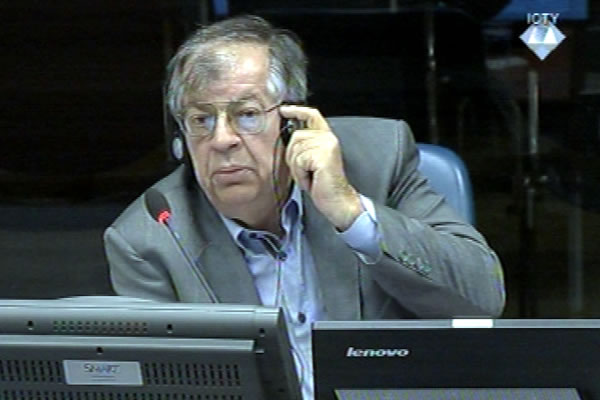Home
NENAD KECMANOVIC WAS DELUDED FOR TWENTY YEARS
Mladic’s defense witness Nenad Kecmanovic contends that the war propaganda and the trust in his friends resulted in him believing for 20 years that Prijedor had witnessed ‘terrible repression by the Serb army and police’. The repression ended with the Muslim population being expelled, their houses burned and the crimes in prison camps. Recently, Kecmanovic received information from some unnamed sources from Banja Luka: the new information ‘refutes and relativizes’ his previous beliefs
 Nenad Kecmanovic, defence witness at Rako Mladic trial
Nenad Kecmanovic, defence witness at Rako Mladic trial Former BH politician Nenad Kecmanovic has appeared as a defense expert in the case against Kvocka et al., involving the crimes in Prijedor, and at the trial for the crimes in Bosanski Samac. Kecmanovic also appeared as a fact witness in the cases against Momcilo Krajisnik and Radovan Karadzic. Today Kecmanovic began his fifth, and last, testimony before the Tribunal in Ratko Mladic’s defense.
In his statement to the defense, the witness described his work in the BH Presidency at the beginning of the war, from 1 June to 6 July 1992, when Kecmanovic left Sarajevo to move to Pale. After a meeting with the Bosnian Serb leadership there, Kecmanovic continued his journey to Belgrade. In a brief examination-in-chief Kecmanovic blamed President Alija Izetbegovic for the war. Kecmanovic highlighted Izetbegovic’s extremist views expressed in his book, Islamic declaration. Izetbegovic wrote the book in 1970 and it was re-issued amid the political turmoil in Yugoslavia in 1990. According to the witness, Izetbegovic wanted an independent state dominated by the Muslims, and at the same time he advocated pan-Islamism, extending ‘from Morocco to Indonesia’. Serbs, on the other hand, wanted to remain in Yugoslavia. Croats ‘endorsed Muslims’ and then made moves ‘that mirrored the Serb moves’, establishing their own autonomous regions.
Kecmanovic’s statement to Mladic’s defense is similar to the one he gave in the case against Karadzic. The paragraph about the crimes in Prijedor was removed from Kecmanovic’s statement in the Mladic case. The explanation was that Kecmanovic didn’t have any direct knowledge of the events there. In the original paragraph, Kecmanovic said that he still stood by the opinion he gave in the expert report in the Kvocka et al. case: the killing of two Serb policemen in Prijedor caused ‘terrible repression by the Serb military and police’ that ended up with ‘the expulsion of the Muslim population’ and ‘burning down of their houses’. In the same report Kecmanovic wrote, and confirmed in his statement to Karadzic’s defense, that the conditions in the prison camps Omarska and Keraterm were ‘extremely inhumane’.
When prosecutor Traldi asked the witness if he still stood by his allegations, Kecmanovic replied that in the meantime he had obtained new information that ‘refutes and relativizes’ his old beliefs. Kecmanovic recounted that he learned about the crimes in Prijedor at the meetings of the BH Presidency while he was still in Sarajevo. When he drafted the expert report for the Kvocka case he didn’t have any personal knowledge of the situation there, Kecmanovic explained. This is why he used an unusual method when he wrote the expert report: he let his friend Bosko Baskot to write the part about Prijedor because Baskot knew more about it. Kecmanovic then put Baskot’s piece into his report without making any special checks.
Relying on his old information from Sarajevo and trusting Baskot, Kecmanovic believed until recently, for full 20 years, that the Prijedor crimes occurred as described in his report. Between his evidence in the Karadzic case in 2012 and his statement to Mladic’s defense, he travelled to Banja Luka, Kecmanovic explained. There he spoke to the people in local bars and elsewhere, and learned that the scale of the crimes against non-Serbs ‘was significantly smaller’. When the judges asked him if he could name the source, or at least one person who told him that, the witness said he couldn’t.
The prosecutor showed the transcripts from several BH Presidency meetings in June 1992. In the transcripts Kecmanovic says that the ‘other side’ was guilty of genocide and that there are ‘prison camps for Muslims’. Kecmanovic argued that his beliefs at the time were formed under the influence of the propaganda disseminated by the Bosnian leadership and the media. This prompted the prosecutor to show him a Bosnian Serb police document which states that the Serb ‘army and the crisis staffs want to round up as many Muslim civilians as possible and to place them in prison camps under inhumane and inadequate conditions’. Kecmanovic agreed that it couldn’t be propaganda because high-ranking police officers spoke creditably about ‘what their authorities are doing’.
In the second part of today’s examination-in-chief, the defense focused on the shelling of Sarajevo. The trial continues tomorrow.
Linked Reports
- Case : Mladic
- 2014-07-09 MLADIC’S WITNESS: SERBS ARE GENETICALLY STRONGER, BETTER, HANDSOMER AND SMARTER
- 2014-07-08 DEFENDING ‘LIVING SPACE’
- 2014-07-07 NEIGHBORS COMMUNICATING OVER GUN SIGHTS
- 2014-07-11 NENAD KECMANOVIC REVISES ERSTWHILE OPINIONS AND POSITIONS
- 2014-07-14 KECMANOVIC: ‘NO GENOCIDE IN BH’
- 2014-07-15 MLADIC'S WITNESS: BH ARMY VIOLATED LAWS OF WAR
